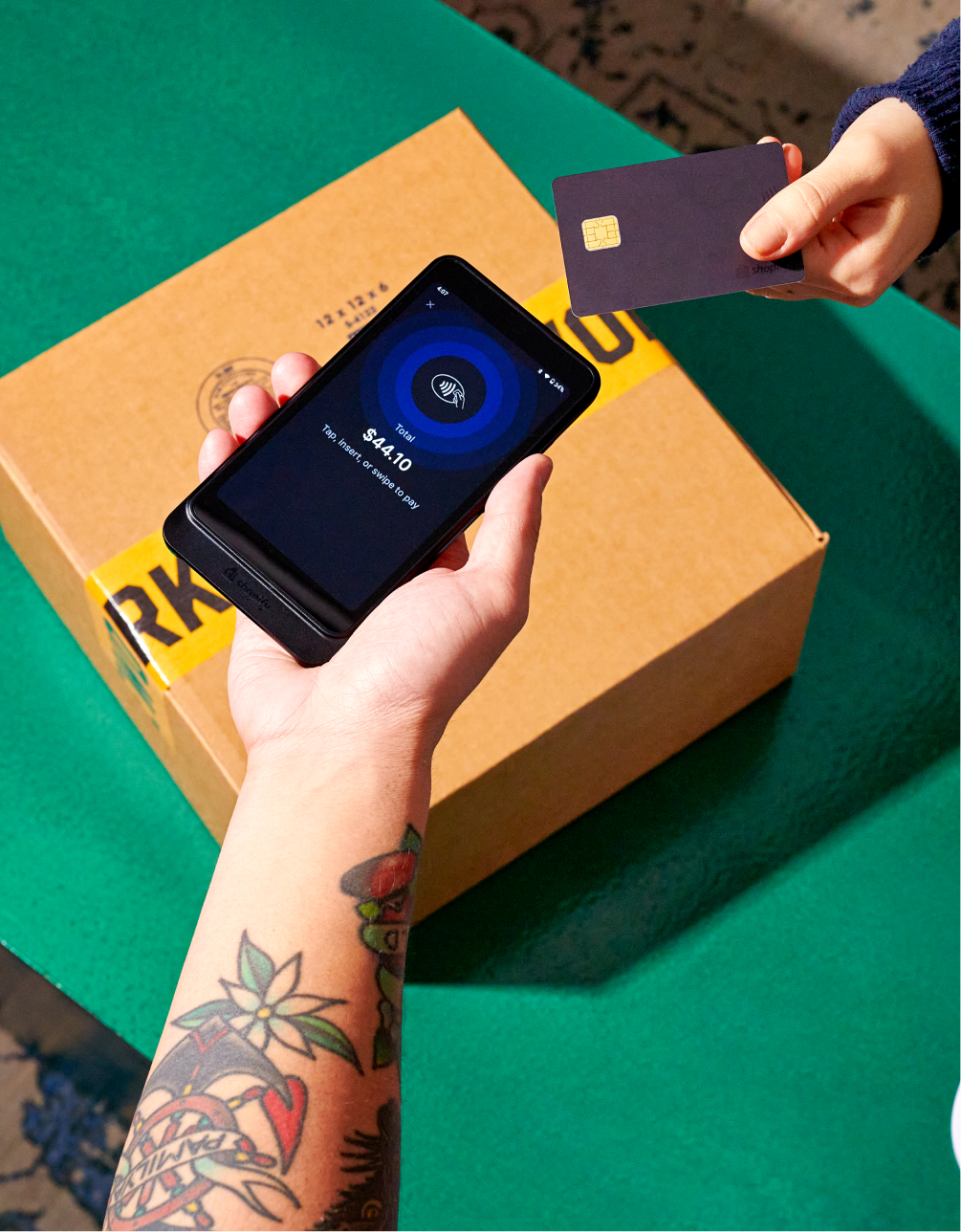- TULA, the probiotic skincare company backed by the famous TV doctor, went live online in 2015, but all was not right in its ecommerce
- Speed, performance, the ability to handle traffic ... they were familiar foes for any web biz, but for TULA they represented the things that kept this brand from becoming what it knew it could
- In 2017, it switched ecommerce partners. Here's the story of how TULA boosted site sessions 161%, traffic 198%, and total transactions 407% in the process
Inside an office space in the Flatiron district, in the shadows of the famed Manhattan building of the same name, are housed vast numbers of a very specific kind of stationery.
There are boxes of them everywhere. Stacks piled on desks from wall to wall. No matter the employee. No matter their title.
They are tiny note cards, five inches tall and three-and-a-half inches wide. Branded on each, ordered through Vistaprint in bulk and with regularity, is the name TULA, a probiotic skincare company backed by a famous doctor with a long television resume.
The freedom to grow, adapt, and evolve
Keep reading to find out how TULA’s switch to Shopify Plus helped increase:
- Site sessions 161%
- Organic traffic 198%
- Conversions 120%
- Total transactions 407%
But if you’d like to talk to an enterprise ecommerce expert …
TULA is a rising power in the ecommerce beauty and cosmetics industry, a star with Shopify Plus, and why it bothers with such decidedly old world items as note cards is a sort of quandary unto itself.
And yet the core of this success story may just lie in the spirit of these cards, sent as customer thank yous, handwritten each of them. In such a hypercompetitive business, TULA has learned, something as simple as personal touch can make all the difference in the world.
“I write cards. Our social media manager writes cards. Our CEO writes cards," says Donnie Soddu, TULA’s VP of ecommerce and digital. "We’ve spent a lot of time and effort trying to really create meaningful experiences at each touchpoint with our customers and just make them feel good.”
The Doctor Is In
Roshini Raj ain’t your average TV doctor.
Dr. Raj has been a staple on national airwaves, for years appearing as an expert guest on The Dr. Oz Show, Today, The View, Good Morning America, and elsewhere, but she is no physician for television lights only.
A Harvard grad, with an M.D. from New York University, the practicing gastroenterologist has touted her medical bona fides with several published research articles on the importance of colon cancer screening.
Yet she also holds a special interest in women’s health, and in her knowledge of how probiotics, bacteria, and yeasts can keep a digestive tract healthy, Dr. Raj saw an opportunity.

In 2014, she helped launched TULA, a skincare company named with the Sanskrit word for “balance.” The goal was to harness the power of probiotics and superfoods to transform its customers’ skin.
The science was strong, though not lost on the doctor was the difficulty of this industry. TULA brought on two heavyweights – Ken Landis, who had previously co-founded Bobbi Brown Cosmetics, and Dan Reich, a tech entrepreneur that had helped grow (and sell) ecommerce companies prior – to ensure Dr. Raj’s vision could truly reach its intended audience.
TULA began by selling exclusively through QVC online. Later, it released on QVC’s TV airwaves, where Dr. Raj could personally share her new company for the first time.
It was a strong way to debut a product line, especially one purposefully limited in quantity. “We’re not the type of brand that has 75 SKUs,” says Soddu. “We focus on giving our customers what they really need.”
TULA’s handful of products, highlighted by its brand staple Hydrating Day & Night Cream, were enough to make an impression. But this company wanted to control its ecommerce experience from top to bottom.
Its website went live in 2015, though all was not right. The speed of the site was an issue. So was its performance, both in terms of its ability to handle traffic and its capacity to effectively translate TULA’s brand message into a full ecommerce experience.
TULA refused to be held back. It wished to let its ambition run wild, to be aggressive in its growth and its pursuit of greater heights.
To do so, it required an ecommerce partner that would keep up.

An Ecommerce Partner to Grow With
On the heels of its hit products, famous spokesperson, and insistence on a personal service strategy that wouldn’t quit, TULA had grown to become a beloved presence in the beauty market.
And yet there was no mistaking the things it did not have with its ecommerce arm. Dependability. Security. Trust that all would go as it was supposed to.
In 2017, TULA could take it no more. It moved to Shopify Plus.
“I think probably the biggest difference is that my team and I can go home for the evening now, or go away for the weekend, and not feel that we have to babysit our website,” Soddu says. “We don’t feel like we have to be on-call because something could break at any moment during a promotion or some other important time for the brand.”
These felt like such basic things – dependability, security, and trust – yet, once they were finally achieved, they seemed to stand for so much more …
They allowed TULA to stretch its legs and run.

TULA, Reborn
Emboldened by renewed faith in its backend, TULA could find all new ways to give its products their due.
It enlisted Wolfpoint, a Shopify Plus Partner and experts in strategic ecommerce design and conversion rate optimization. Wolfpoint, which helped guide TULA’s migration and website redesign without losing any of its existing data or SEO value, would work to test the limits of TULA's ecommerce strategy.
Top of mind was to fix the things TULA found were the largest hang-ups on its old site.
First, its navigation, which might have seemed like a simple tweak but required a little ingenuity to make it more streamlined and easier to shop through:
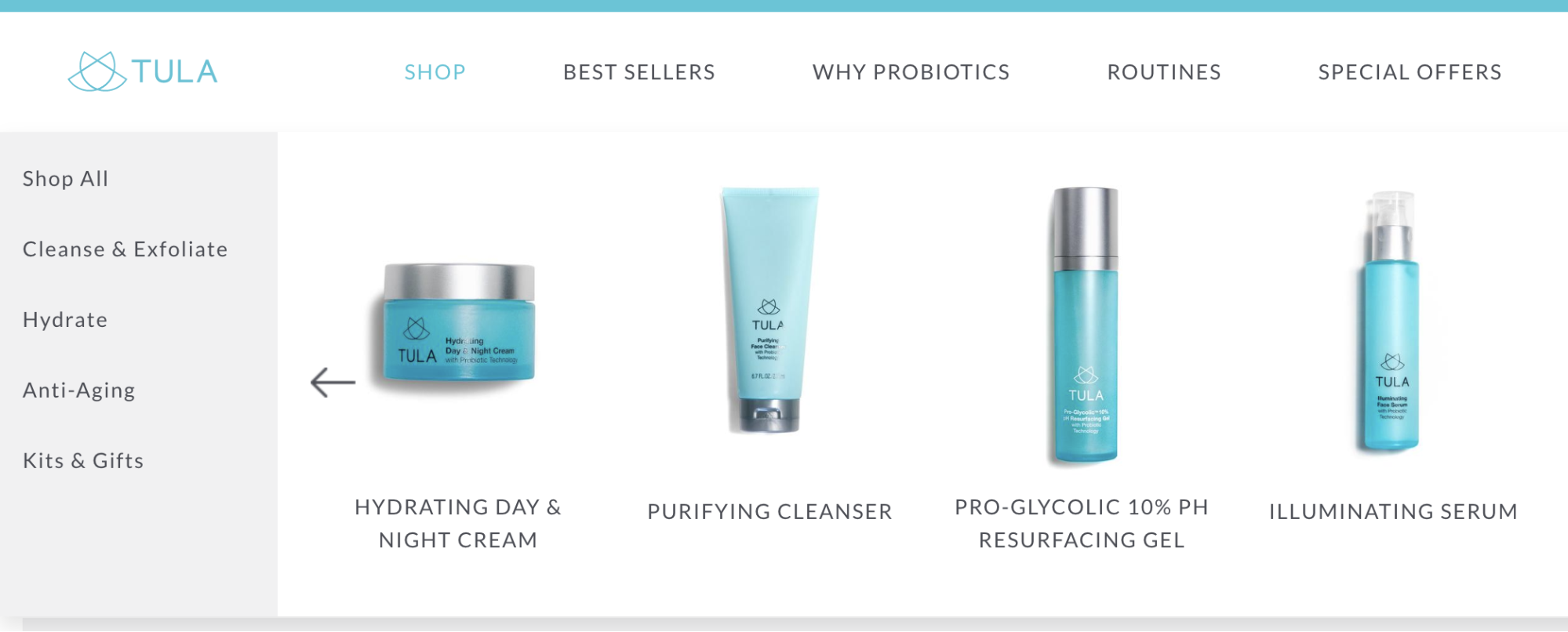
Next, its checkout page, which TULA found its customers were stalling on, kneecapping its conversion rates and losing considerable sales in the process.
Wolfpoint deployed heat maps and scoured screen recordings of would-be transactions to find precisely where shoppers were abandoning their carts.
What resulted was a “more simplified, consolidated, still very effective site navigation and checkout process,” says Jon Murphy, Wolfpoint’s president, who helped oversee TULA's redesign and checkout reimagining that …
11 months after implementation, through ongoing optimization efforts, has contributed to a 120% sitewide boost in conversation rate.

What was more, TULA and Wolfpoint discovered with Shopify Plus a luxury the skincare company had never enjoyed with its old platform: reliable data.
Suddenly, TULA was able to more accurately gauge its traffic and metrics to learn what was working, what needed smoothing out, and how to optimize the numbers laid before them.
Nearly a year after its Shopify Plus migration, TULA could smile at its progress:
- Overall site sessions jumped by 161%
- Organic traffic increased by 198%
- Total transactions rose by 407%
Solid data meant peace of mind, but it also laid a much sturdier foundation for TULA and Wolfpoint to build on this ecommerce strategy.
With its essentials covered, TULA branched out in exciting ways. Confident in its product quality, the company rolled out a unique Try Before You Buy campaign (complete with its own custom one-click checkout page), whereby customers paid just shipping up front and would be charged only if they chose to keep their products after 30 days.

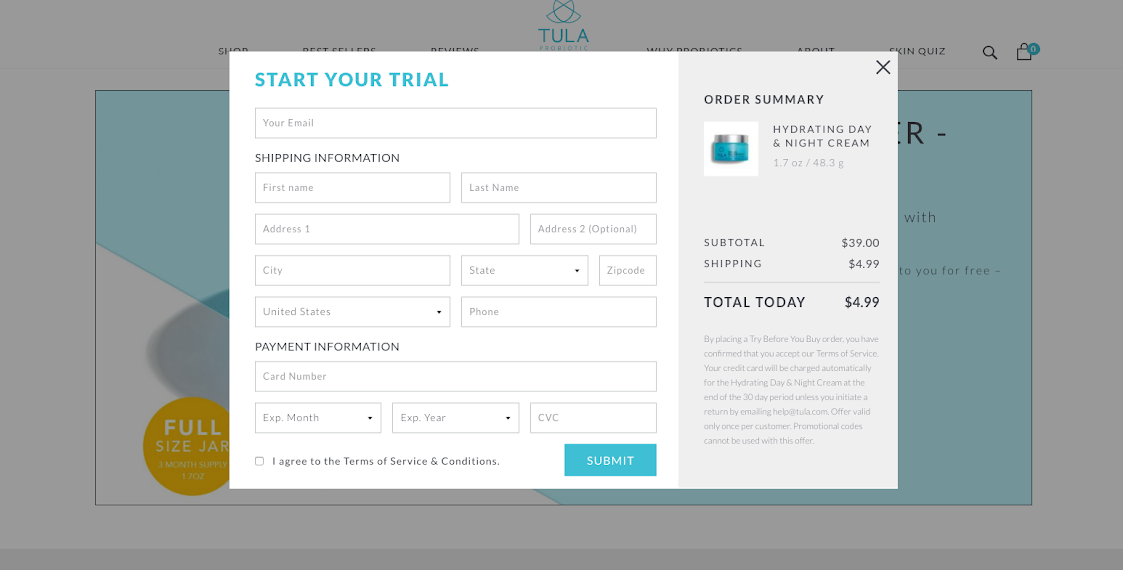
TULA also dove into a new area of business that seemed to make all the sense in the world.
Through ReCharge, a Shopify Plus Technology Partner that drives subscription sales, TULA’s customers, many of whom rely on its products for their everyday skincare routine, now regularly get their favorite products with less friction and less hassle.
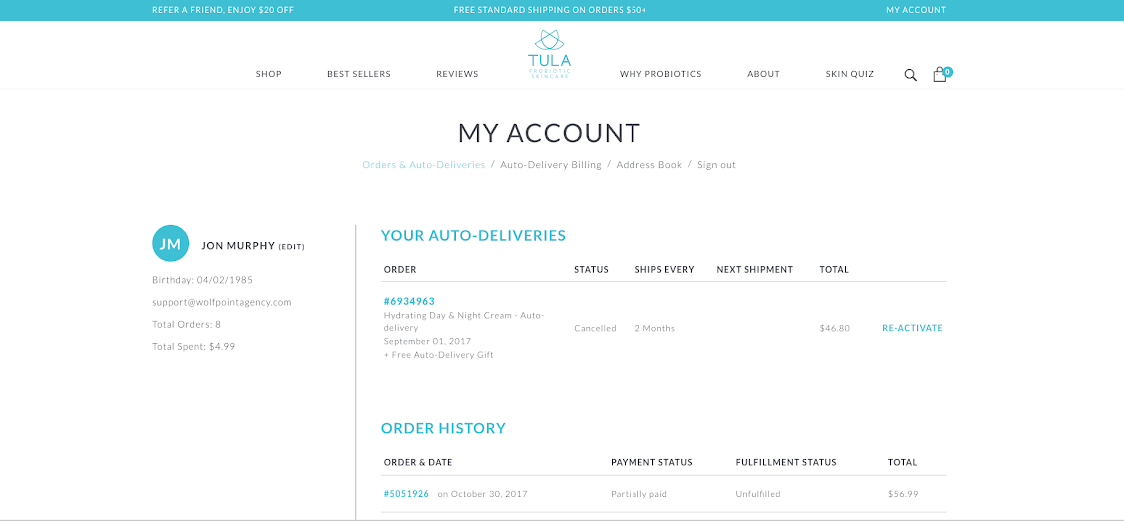
As recently as May 2017, subscription sales accounted for precisely 0% of TULA’s business.
Less than a year later, nearly 20% of TULA’s ecommerce revenue arrives through auto-renewed transactions.
‘Thanks for Choosing Us’
TULA and Wolfpoint have forged together a partnership built to last, neither party ever quite resting on its laurels, always pushing, always looking for ways to innovate.
“I think you can do a great redesign of the site, but ecommerce is like a living, breathing thing,” says Murphy. “You really have to adapt to what you’re seeing in real-time with user trends changing, market trends changing. TULA definitely has the perfect attitude that their site is never complete. It’s never done.”
Soddu jumped right in. “Our website is a constant work in progress,” she says. “We’re a team that is always looking to optimize, we’re always looking to see what’s going on in the market, what our competitors are doing. How can we make sure that we have an optimized digital experience?”
TULA has, by its own estimation, put its early ecommerce days behind it. As its tech troubles have fallen away, and its products and brand experience have become the leading customer touchpoints for this company, there is a much different present before it, and a much greater future lying ahead.
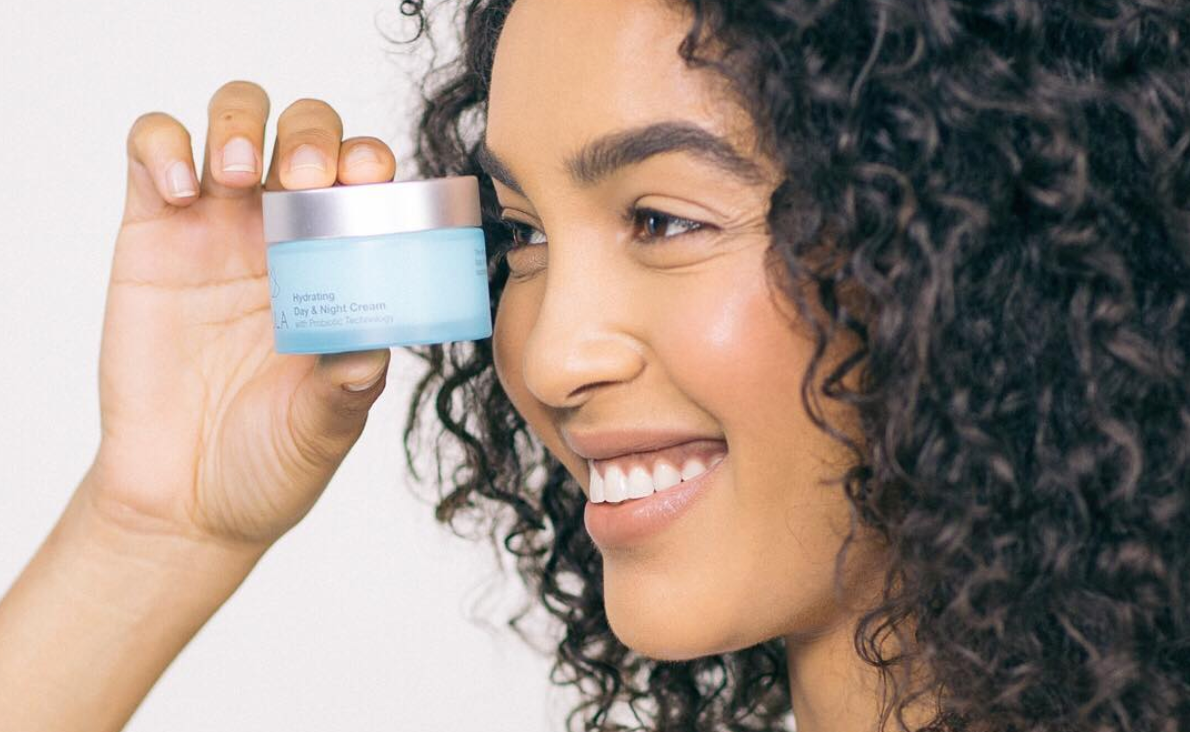
It all goes back to the Flatiron district, on the desks of the people behind TULA’s success. As the company grows and reaches a wider swath of customers, so, too, does its need for note cards, which pour in – 10,000, sometimes 20,000, at a time.
Around peak seasons like the holidays, handwriting these thank yous can really take up good chunks of time. And yet, nonetheless, the task is baked into the schedules of TULA’s team.
They relish in wishing their customers, many who are now so familiar to the company, great relaxation on that upcoming vacation, or kind appreciation for sharing TULA’s products with family members or friends.
“We realize that we’re a company that’s playing in a crowded space. There are a lot of beauty brands out there,” says Soddu. “We recognize a lot of our customers by name, and we love that relationship and want to tell them that in writing.
It’s about us telling them that we hope they really enjoy their experience with TULA – to thank them for choosing us and giving us a try.


